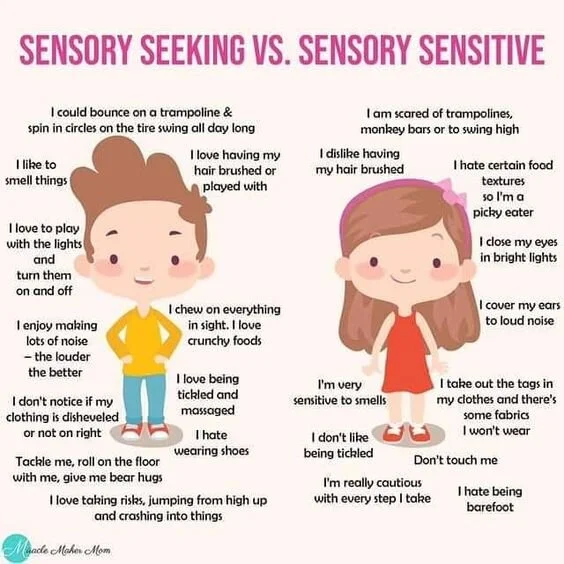Sensory Processing Disorder
Day 7 of a 30-day series originally published for Facebook April 2021
Sensory processing disorder occurs when someone has trouble managing information that is processed through their 5 senses. SPD is considered a comorbid condition with Autism, meaning that most Autistics have trouble with sensory processing, but not all people who have trouble with sensory processing have autism.
SPD breaks down into two main categories; hypersensitivity and hypersensitivity. Hypersensitive individuals are highly sensitive to senses such as sound, touch, taste, etc. This may look like avoiding loud spaces, wanting all the tags removed from his/her clothing, being overly turned off by food smells, being distracted or feeling sick around bright lighting, or preferring only certain food textures.
Hyposensitive people can look like... turning the volume up way too loud on the television, recklessly flinging their body around in space, a love of fast or jarring activities, obsessively smelling things, or putting non-edible items in their mouth.
It is entirely possible, and even very likely, for an autistic person to have both hyper and hyposensitivities. M for example is extremely fearful of the toilet flushing, or a train's whistle. Sometimes he will listen to the TV at such a low volume nobody can hear it but him. Other times he will talk so loudly he doesn't realize he is yelling. He does not care at all if his hands are sticky, or if his clothes are on correctly when he wears them... but most of the time at home he doesn't wear clothing because he doesn't like the feeling of it on his body. He will come and squeeze you way too hard, but then can't hold your hand for too long without the sensation becoming too much.
It's fair to say that SPD can be a source of major frustration in a family, but it can also be dangerous. We have to be careful that M's body stays within safe temperature ranges. He would sit in a hot car, and despite being old enough to unbuckle himself and just get out of the car, he would sit there, not realizing his body was overheating (this is actually a huge fear of ours.) Sending him to a summer camp in August is also not an option, he wouldn't notice he was overheating, and he wouldn't tell anyone he needed help. M's food sensitivities are also extreme. He's not in danger of being malnourished, but he will be at risk for diabetes and obesity if we aren't able to broaden his preferences. He has also never taken medication of any kind. We are thankful he is healthy, but if he were to ever need antibiotics or pain relievers, they would have to be given as a shot.
It's important to remember that those with SPD aren't being "difficult" or "stubborn" or "clueless." Their brain simply processes incoming sensory input differently than you do and starting at a young age, they have to learn their own ways of mitigating and managing that input.

